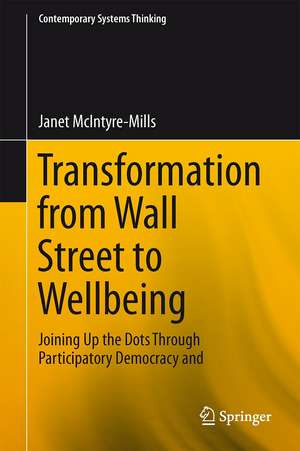Transformation from Wall Street to Wellbeing: Joining Up the Dots Through Participatory Democracy and Governance to Mitigate the Causes and Adapt to the Effects of Climate Change: Contemporary Systems Thinking
Autor Janet McIntyre-Millsen Limba Engleză Hardback – 3 sep 2014
| Toate formatele și edițiile | Preț | Express |
|---|---|---|
| Paperback (1) | 384.86 lei 43-57 zile | |
| Springer Us – 22 sep 2016 | 384.86 lei 43-57 zile | |
| Hardback (1) | 392.21 lei 43-57 zile | |
| Springer Us – 3 sep 2014 | 392.21 lei 43-57 zile |
Din seria Contemporary Systems Thinking
- 18%
 Preț: 966.27 lei
Preț: 966.27 lei - 15%
 Preț: 646.75 lei
Preț: 646.75 lei - 15%
 Preț: 643.34 lei
Preț: 643.34 lei - 15%
 Preț: 644.63 lei
Preț: 644.63 lei - 15%
 Preț: 657.25 lei
Preț: 657.25 lei - 18%
 Preț: 1219.94 lei
Preț: 1219.94 lei - 18%
 Preț: 950.21 lei
Preț: 950.21 lei - 18%
 Preț: 959.67 lei
Preț: 959.67 lei - 15%
 Preț: 672.95 lei
Preț: 672.95 lei - 18%
 Preț: 950.66 lei
Preț: 950.66 lei - 18%
 Preț: 981.61 lei
Preț: 981.61 lei - 18%
 Preț: 1119.56 lei
Preț: 1119.56 lei - 18%
 Preț: 1565.61 lei
Preț: 1565.61 lei - 18%
 Preț: 905.68 lei
Preț: 905.68 lei - 18%
 Preț: 948.47 lei
Preț: 948.47 lei - 18%
 Preț: 894.16 lei
Preț: 894.16 lei - 18%
 Preț: 1020.60 lei
Preț: 1020.60 lei - 18%
 Preț: 1226.42 lei
Preț: 1226.42 lei - 18%
 Preț: 950.84 lei
Preț: 950.84 lei - 15%
 Preț: 705.83 lei
Preț: 705.83 lei - 18%
 Preț: 953.03 lei
Preț: 953.03 lei -
 Preț: 390.08 lei
Preț: 390.08 lei - 15%
 Preț: 646.11 lei
Preț: 646.11 lei - 18%
 Preț: 891.80 lei
Preț: 891.80 lei - 15%
 Preț: 647.08 lei
Preț: 647.08 lei - 18%
 Preț: 949.42 lei
Preț: 949.42 lei - 15%
 Preț: 653.14 lei
Preț: 653.14 lei -
 Preț: 381.21 lei
Preț: 381.21 lei - 15%
 Preț: 652.17 lei
Preț: 652.17 lei - 18%
 Preț: 960.61 lei
Preț: 960.61 lei - 15%
 Preț: 649.54 lei
Preț: 649.54 lei - 18%
 Preț: 733.96 lei
Preț: 733.96 lei - 18%
 Preț: 957.44 lei
Preț: 957.44 lei - 15%
 Preț: 649.06 lei
Preț: 649.06 lei
Preț: 392.21 lei
Nou
Puncte Express: 588
Preț estimativ în valută:
75.05€ • 78.56$ • 62.46£
75.05€ • 78.56$ • 62.46£
Carte tipărită la comandă
Livrare economică 31 martie-14 aprilie
Preluare comenzi: 021 569.72.76
Specificații
ISBN-13: 9781489974655
ISBN-10: 1489974652
Pagini: 221
Ilustrații: XVI, 221 p. 16 illus., 5 illus. in color.
Dimensiuni: 155 x 235 x 20 mm
Greutate: 0.51 kg
Ediția:2014
Editura: Springer Us
Colecția Springer
Seria Contemporary Systems Thinking
Locul publicării:New York, NY, United States
ISBN-10: 1489974652
Pagini: 221
Ilustrații: XVI, 221 p. 16 illus., 5 illus. in color.
Dimensiuni: 155 x 235 x 20 mm
Greutate: 0.51 kg
Ediția:2014
Editura: Springer Us
Colecția Springer
Seria Contemporary Systems Thinking
Locul publicării:New York, NY, United States
Public țintă
ResearchCuprins
Introduction and Overview.- Vulnerability and risk: Towards stewardship of a post carbon economy.- Facing up to fin de siecle culture.- New Regionalist monitory democracy and governance: A reply to the so-called problem of cosmopolitan politics.- Greed and Complicity: Responsibility to others and future generations.- Conclusion: towards a nonanthropocentric stewardship approach.- Post Script: responding to existential risks.- Executive Summary.- User Guide: For Engagement to address climate change through participatory democracy and governance.
Notă biografică
Janet McIntyre-Mills is Associate Professor Flinders University, and Adjunct Professor University of Indonesia. Her books address social and environmental justice concerns and include, for example: ‘Global Citizenship and Social Movements’, Harwood, McMillan, ‘Critical Systemic Praxis for Social and Environmental Justice’, Springer; ‘Systemic Governance and Accountability: working and re-working the conceptual and spatial boundaries,’ published by Springer; ‘User Centric policy design to address complex need’s, Nova Science. Emergence has recently published ‘Identity, democracy and sustainability’. It proposes a new architecture for governance.
Her research addresses wellbeing, consciousness and cosmopolitan ethics associated with the design and transformation of governance and democracy. It focuses on excessive social, economic and environmental consumption and suggests ways to mitigate the worst impacts of climate change through protecting cultural ecosystems. She is a board member of several journals, including the Journal of Globalization Studies, Systems Research and Behavioural Science, for example. She is an elected board member of Research Committee 10 on Participation and Organizational Transformation of the International Sociological Association, and has participated in Research Committee 51 of Socio-cybernetics. She is also a member of the International Systems Sciences and the Action Learning and Action Association.
Her research addresses wellbeing, consciousness and cosmopolitan ethics associated with the design and transformation of governance and democracy. It focuses on excessive social, economic and environmental consumption and suggests ways to mitigate the worst impacts of climate change through protecting cultural ecosystems. She is a board member of several journals, including the Journal of Globalization Studies, Systems Research and Behavioural Science, for example. She is an elected board member of Research Committee 10 on Participation and Organizational Transformation of the International Sociological Association, and has participated in Research Committee 51 of Socio-cybernetics. She is also a member of the International Systems Sciences and the Action Learning and Action Association.
Textul de pe ultima copertă
This book has two main objectives. The first is to make the case for social change through exploring post disciplinary and post materialist frameworks to address greed, zero sum competition for resources, the commodification of the powerless and the environment. Secondly, it develops a reframed approach to measuring wellbeing – not productivity – as a sign of economic success. Thus the book considers the challenge posed by Stiglitz (2010) to the Australian Productivity Commission, namely to foster an understanding that the wellbeing of humanity is dependent on the global commons.
Transformation from Wall Street to Wellbeing also examines whether a change in the architecture of democracy and governance could balance individual and collective needs more effectively through participation, guided by the axiom that people ought to be encouraged to be free and diverse; but only to the extent that freedom and diversity does not undermine the rights of others. What does this mean for constructing and re-constructing the way in which we live? This volume makes a case for cosmopolitan approaches that scale up local engagement and that enable monitory democracy from below. Instead of Big Brother controlling the people who are unable to think critically, people are encouraged to monitor the use of resources locally. The process of monitoring needs to be supported by means of the principle of subsidiarity and buttressed by international law spanning post national regions. It discusses participatory action research to prefigure a means to hold the market to account – to ensure that the use of resources that are necessary for the common good are accessible and equitable.
This is the companion book to Systemic Ethics and Non-Anthropocentric Stewardship: Implications for Transdisciplinarity and Cosmopolitan Politics, also by the author. The two volumes comprise a series of essays that can be read separately and in any order or aschapters on a common theme, namely, “How should we live?”
Transformation from Wall Street to Wellbeing also examines whether a change in the architecture of democracy and governance could balance individual and collective needs more effectively through participation, guided by the axiom that people ought to be encouraged to be free and diverse; but only to the extent that freedom and diversity does not undermine the rights of others. What does this mean for constructing and re-constructing the way in which we live? This volume makes a case for cosmopolitan approaches that scale up local engagement and that enable monitory democracy from below. Instead of Big Brother controlling the people who are unable to think critically, people are encouraged to monitor the use of resources locally. The process of monitoring needs to be supported by means of the principle of subsidiarity and buttressed by international law spanning post national regions. It discusses participatory action research to prefigure a means to hold the market to account – to ensure that the use of resources that are necessary for the common good are accessible and equitable.
This is the companion book to Systemic Ethics and Non-Anthropocentric Stewardship: Implications for Transdisciplinarity and Cosmopolitan Politics, also by the author. The two volumes comprise a series of essays that can be read separately and in any order or aschapters on a common theme, namely, “How should we live?”
Caracteristici
Invites readers to participate in sustainable and ethical governance Develops a reframed approach to measure wellbeing – not productivity – as a sign of economic success Makes the case for social change through exploring post disciplinary and post materialist frameworks to address greed, zero sum competition for resources, the commodification of the powerless and the environment Includes supplementary material: sn.pub/extras

















